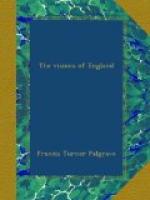He saw not; Ranke’s dispassionate summary of the attempted ’arrest of five members,’ which has been always held one of the King’s most arbitrary steps, as it was, perhaps, the most fatal, illustrates the view here taken: ’The prerogative of the Crown, in the sense of the early kings’ (unconditional right of arrest, in cases of treason), ’and the privilege of Parliament, in the sense of coming times, were directly contradictory to each other’: (viii: 10).
Till they drank the poison; A sentence weighty with his judicial force may be here quoted from Hallam:—’The desire of obtaining or retaining power, if it be ever sought as a means, is soon converted into an end.’ The career of the Long Parliament supports this judgment: of it ’it may be said, I think, with not greater severity than truth, that scarce two or three public acts of justice, humanity, or generosity, and very few of political wisdom and courage, are recorded of them from their quarrel with the King to their expulsion by Cromwell’: (Const. Hist. ch. x: Part i).
The chrisom; Name for the white cloth in which babes were veiled immediately after Baptism.
Artist in plots; See Ranke (viii: 5) for Pym’s skilful use of a supposed plot, (the main element in which was known by himself to be untrue), in older to terrify the House and ensure the destruction of Stafford; and Hallam (ch. ix).—Admiration of Pym may be taken as a proof that a historian is ignorant of, or faithless to, the fundamental principles of the Constitution:—as the worship of Cromwell is decisive against any man’s love of liberty, whatever his professions.
O King; ’Cromwell, like so many other usurpers, felt his position too precarious, or his vanity ungratified, without the name which mankind have agreed to worship.’ The conversations recorded by Whitelock are conclusive on this point: ’and, though compelled to decline the crown, he undoubtedly did not lose sight of the object for the short remainder of his life’ (Hallam).
The sky by a veil; See Appendix D.
And he walks; ’He said on one occasion, He goes furthest who knows not whither he is going’: (Ranke: xii: 1).
Purrs about God; Examples, (the tone of which justifies this phrase, and might deserve a severer), may be found by the curious in the frailties of poor human nature, passim, in Cromwell’s ’Letters and Speeches,’ for which, (although not always edited with precise accuracy), we are indebted to Mr. T. Carlyle. But the view which he takes of his ‘hero,’ whether in regard of many particular facts alleged or neglected, or of the general estimate of Cromwell as a man,—as it appears to the author plainly untenable in face of proved historical facts, is here rejected.




